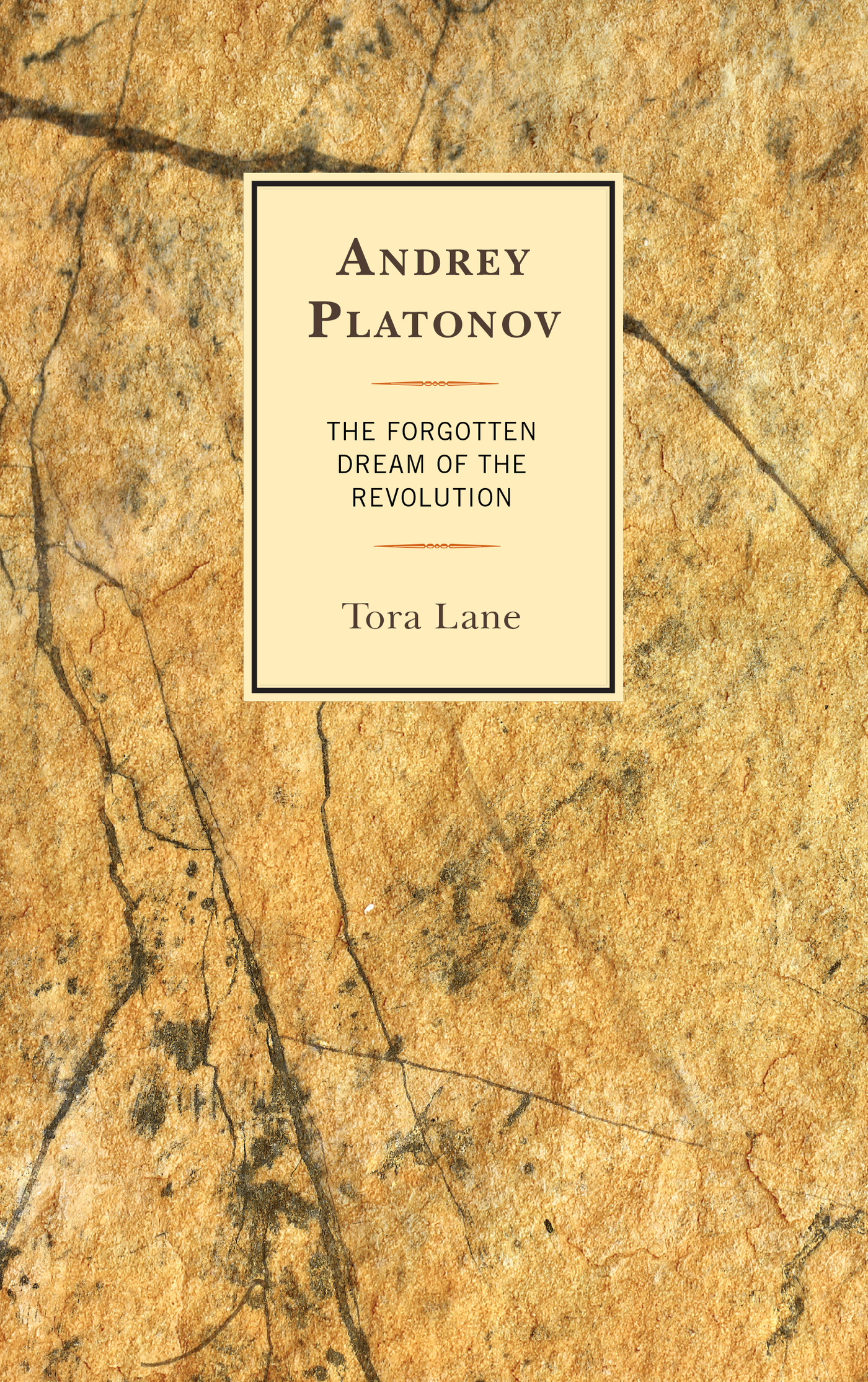Andrey Platonov
Andrey Platonov
The Forgotten Dream
of the Revolution
Tora Lane
LEXINGTON BOOKS
Lanham Boulder New York London
Published by Lexington Books
An imprint of The Rowman & Littlefield Publishing Group, Inc.
4501 Forbes Boulevard, Suite 200, Lanham, Maryland 20706
www.rowman.com
Unit A, Whitacre Mews, 26-34 Stannary Street, London SE11 4AB
Copyright 2018 by The Rowman & Littlefield Publishing Group, Inc.
All rights reserved. No part of this book may be reproduced in any form or by any electronic or mechanical means, including information storage and retrieval systems, without written permission from the publisher, except by a reviewer who may quote passages in a review.
British Library Cataloguing in Publication Information Available
Library of Congress Cataloging-in-Publication Data
Names: Lane, Tora, author.
Title: Andrey Platonov : an other revolution / Tora Lane.
Description: Lanham : Lexington Books, 2018. | Includes bibliographical references and index.
Identifiers: LCCN 2018000933 (print) | LCCN 2017059763 | ISBN 9781498547765 (Electronic) | ISBN 9781498547758 (cloth : alk. paper)
Subjects: LCSH: Platonov, Andrey Platonovich, 1899-1951--Criticism and interpretation. | Soviet Union--History--Revolution, 1917-1921--Literature and the revolution. | Revolutions in literature.
Classification: LCC PG3476.P543 (print) | LCC PG3476.P543 Z739 2018 (ebook) | DDC 891.73/42--dc23
LC record available at https://lccn.loc.gov/2018000933
 TM The paper used in this publication meets the minimum requirements of American National Standard for Information Sciences Permanence of Paper for Printed Library Materials, ANSI/NISO Z39.48-1992.
TM The paper used in this publication meets the minimum requirements of American National Standard for Information Sciences Permanence of Paper for Printed Library Materials, ANSI/NISO Z39.48-1992.
Printed in the United States of America
To the bright memory of Gunhild Garmo
Acknowledgments
The ideas and chapters of this book developed over a long period of time as the fruit of two separate postdoctoral research projects. The first, which had to do with Andrei Platonovs understanding of the Revolution, was conducted at the Department of Slavic Languages and Literatures at Stockholm University, and I am very grateful to the Ahlstrm and Terserus Foundation for their funding. I also wish to express my gratitude to the Baltic Sea Foundation for financing the second project Loss of Grounds as Common Grounds, a large multidisciplinary project, which was led by Marcia Schuback S Cavalcante at Sdertrn University. I am endlessly indebted to Marcia for her ingenious scholarly advice, guidance, support and inspiration. It is difficult to imagine that this book would have seen the light of day without her. I also feel so lucky to have had the opportunity to discuss and develop my ideas and readings of Platonov with all the participants of the research project: Irina Sandomirskaja, Leonard Neuger, Gustav Strandberg, and Ludger Hagedorn. Encouragement, comments, questions, and criticism from Peter Alberg Jensen, Per-Arne Bodin, Aleksei Semenenko, and Hans Andersson have also been very helpful. I send special thanks to Charles Rougle for having done a wonderful job copyediting the book. Finally, I thank my husband, Oleg Iliyuyshchenko, for never tiring of discussing with me questions about Platonov, the Revolution and writing, and for always sharing everything.
Permissions Credits
Excerpts from Chevengur by Andrei Platonov, translated by Anthony Olcott. Copyright 1978 by Ardis. Reprinted by arrangement with The Overlook Press, Peter Mayer Publishers, Inc. www.overlookpress.com. All rights reserved.
Excerpts from Chevengur. Kotlovan. Sobranie sochinenii v 8-kh tomakh: vol 2, ed. N.Malygina. Moscow: Vremia reprinted with permission.
Excerpts from Fabrika Literatury. Sobranie sochinenii v 8-kh tomakh: vol 8, ed. N. V. Kornienko. Moscow: Vremia reprinted with permission.
Excerpts from Happy Moscow, translated by Robert and Elizabeth Chandler, New York: New York Review of Books. Reprinted with permission.
Excerpts from Schastlivaia Moskva. Sobranie sochinenii v 8-kh tomakh: vol 4, (ed.ed. N. V. Kornienko. Moscow: Vremia reprinted with permission.
Excerpts from Smerti net!Sobranie sochinenii v 8-kh tomakh: vol 5, ed. N. V. Kornienko. Moscow: Vremia reprinted with permission.
Excerpts from Sochineniia. Tom 1: 19181927 Kniga 2: Stati. Moscow: IMLI RAN reprinted with permission.
Excerpts from Soul and Other Stories, translated by Robert and Elizabeth Chandler with Katia Grigoruk, Angela Livingstone, Olga Meerson, and Eric Naiman. New York: New York Review of Books. Reprinted with permission.
Excerpts from Soul by Andrey Platonov, published by Harvill Press. Reprinted by permission of The Random House Group Limited. 2003
Excerpts from The Foundation Pit, translated by Robert and Elizabeth Chandler with Olga Meerson. New York: NYRB Classics. Reprinted with permission.
Excerpts from The Retum and Other Stories by Andrey Platonov, published by Harvill Press. Reprinted by permission of The Random House Group Limited. 1999
Excerpts from Usomnivshiisia Makar.Sobranie. sochinenii v 8-kh tomakh: vol 1, ed. N. V. Kornienko. Moscow: Vremia reprinted with permission.
Authors Note
When possible, I quote existing translations of Platonovs texts. Other translations are done by me or by Charles Rougle. I have used the Library of Congress system for transliteration, modifying it for names to make them recognizable to readers not acquainted with Russian.
Introduction
This book was written in 2016, on the eve of the centennial of the October Revolution of 1917. If by the antagonism that it spurred the Revolution shaped the twentieth-century political landscape of Europe and beyond, today it has acquired a specific meaning as an object of both memory politics and the memory of the political. One reason is that because the Revolution saw itself as a break with the past, it exerted a repressive totalitarian politics toward memory. Not only was the official memory narrative of the prerevolutionary past manipulated, the status of individual memory was also constantly subjected to political articulations and repressions. Today, at the same time as the Revolution itself has become a memory of a historical event that leads us to ask about what it was, the idea of the Revolution, that is, the emancipation of all mankind, perhaps the most significant utopia in the history of democracy, continues to be significant in its afterlife. With the failure of the Russian Revolution and the demise of the Soviet Union, it seems that in the ambivalence of current politics we have been able to bury the Revolution as a political idea and at the same time preserve the idea of emancipation in the now nearly apolitical concept of democracy. The title of this bookAndrey Platonov: The Forgotten Dream of the Revolutionrefers primarily to the question of memory in revolutionary times, and more specifically to the problem of the experience of intimate memory during a revolutionary period that offered ready-made political models for formulating the experience of the present and the past, and projected its realization onto the future. Yet in writing about the question of intimate memory from the perspective of Andrei Platonov, who although he was critical never repudiated his fidelity to the 1917 Revolution, the book also attempts to bring out an aspect of the Revolution that is often forgotten in current memory politics, namely the aspiration to be a revolution of the experience of inner life in a way yet untold.
Next page
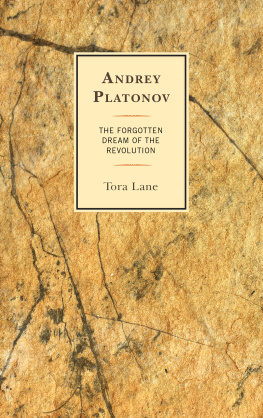

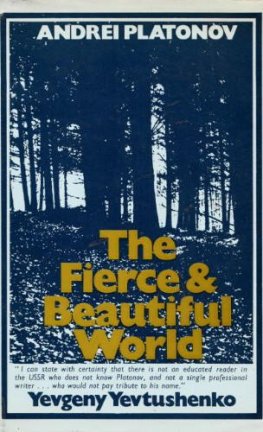
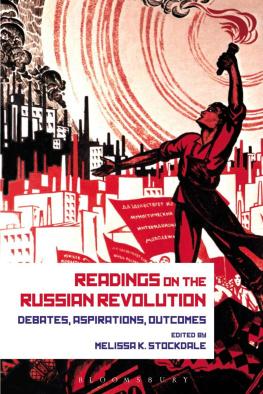
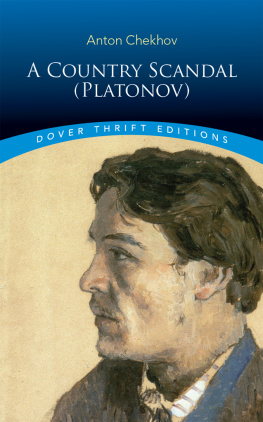

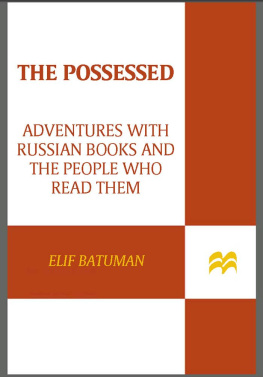

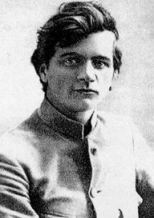
 TM The paper used in this publication meets the minimum requirements of American National Standard for Information Sciences Permanence of Paper for Printed Library Materials, ANSI/NISO Z39.48-1992.
TM The paper used in this publication meets the minimum requirements of American National Standard for Information Sciences Permanence of Paper for Printed Library Materials, ANSI/NISO Z39.48-1992.